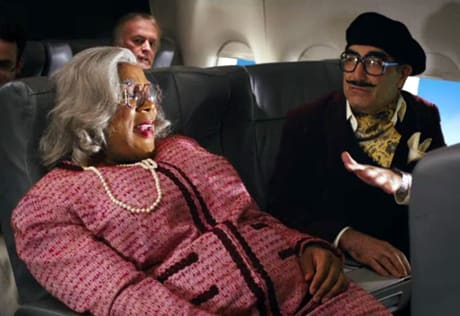Something consistent throughout the works of Tyler Perry, whether featuring the daffy shenanigans of the titular Madea shaking her pendulous prosthetic breasts or pretending to have a profound understanding of women's issues and life lessons, is a rushed, clumsy writing style that has characters spew repetitive, wooden dialogue with little progress while standing around awkwardly and unrealistically.
It's a trajectory exacerbated by Perry's flat, almost incompetent direction, which literally rests on a shot-reverse-shot '80s television aesthetic, leaving us nothing to consider other than the strained character reactions and unrealistic misunderstandings such as, "Do you have Wi-Fi?" "Yes, we have waffles." "No, I said Wi-Fi."
Yet something about his broad humour and career-long didactics regarding speaking your mind (without considering the perspective of others) and responding emotionally to any given situation fills a cinematic void. Regardless of quality, his understanding of demographics and keen aptitude for marketing often supersede the expectations of basic filmmaking, even when dressed up in drag and emasculated in a Big Momma-adjacent capacity, self-consciously embracing the antiquated taboo of black male sexuality.
Witness Protection is no different, boasting the same contrived gags, overly protracted set-ups and an abundance of dead air, but it's hard to say whether it's any worse or better than everything else in the Madea lexicon. This time out, she isn't in jail or attending a class reunion, rather she's playing host to a family of rich white people in witness protection after their seemingly mentally challenged patriarch, George (Eugene Levy), winds up taking the fall for a mostly undefined Ponzi scheme.
Written as mere archetypes – Denise Richards plays the younger trophy wife with a heart-of-gold deep down; Danielle Campbell is bitchy teen texter Cindy (her first line is "I hate old people"; and Devon Leos as the dorky fat kid desperate for an active father figure – this family learns a thing or two about open communication (defined here by irrational outbursts and yelling with inexplicable, resultant character arcs) from the sassy Madea.
Realistically, any movie that delivers its moral via a heartfelt tête-à-tête between Denise Richards and a grown man dressed as an obese senior citizen isn't reaching for anything particularly profound. But the overall vacuum effect of the film, which is so laboured that it actually separates plot points from comedy, is almost astounding in its badness.
Fortunately, the implication that black and white equals Jewish inappropriately distracts from the sheer laziness of it all, giving Israel a little something to think about.
(Alliance)It's a trajectory exacerbated by Perry's flat, almost incompetent direction, which literally rests on a shot-reverse-shot '80s television aesthetic, leaving us nothing to consider other than the strained character reactions and unrealistic misunderstandings such as, "Do you have Wi-Fi?" "Yes, we have waffles." "No, I said Wi-Fi."
Yet something about his broad humour and career-long didactics regarding speaking your mind (without considering the perspective of others) and responding emotionally to any given situation fills a cinematic void. Regardless of quality, his understanding of demographics and keen aptitude for marketing often supersede the expectations of basic filmmaking, even when dressed up in drag and emasculated in a Big Momma-adjacent capacity, self-consciously embracing the antiquated taboo of black male sexuality.
Witness Protection is no different, boasting the same contrived gags, overly protracted set-ups and an abundance of dead air, but it's hard to say whether it's any worse or better than everything else in the Madea lexicon. This time out, she isn't in jail or attending a class reunion, rather she's playing host to a family of rich white people in witness protection after their seemingly mentally challenged patriarch, George (Eugene Levy), winds up taking the fall for a mostly undefined Ponzi scheme.
Written as mere archetypes – Denise Richards plays the younger trophy wife with a heart-of-gold deep down; Danielle Campbell is bitchy teen texter Cindy (her first line is "I hate old people"; and Devon Leos as the dorky fat kid desperate for an active father figure – this family learns a thing or two about open communication (defined here by irrational outbursts and yelling with inexplicable, resultant character arcs) from the sassy Madea.
Realistically, any movie that delivers its moral via a heartfelt tête-à-tête between Denise Richards and a grown man dressed as an obese senior citizen isn't reaching for anything particularly profound. But the overall vacuum effect of the film, which is so laboured that it actually separates plot points from comedy, is almost astounding in its badness.
Fortunately, the implication that black and white equals Jewish inappropriately distracts from the sheer laziness of it all, giving Israel a little something to think about.
